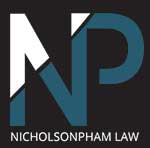Surrogacy and A.R.T.:
Helping to Create Families
A.R.T.
Legal Guidance for Assisted Reproductive Technologies
The ways in which families can now be created have increased significantly in the last few decades, thanks to medical advances, expansion of legal concepts of legal parenthood, and greater societal acceptance of diverse family structures. Adoption is no longer the only option for individuals and couples who cannot conceive on their own. The attorneys at NicholsonPham are leaders in this field. We have the knowledge and experience to guide you through the complex medical and legal issues involved in assisted reproductive technology (ART) law throughout North Carolina.
 Call: (919) 883-4900
Call: (919) 883-4900
Types of A.R.T. Medical Procedures
SURROGACY & A.R.T. FAQs
There are many ART methods by which a child might be conceived. Intrauterine insemination (IUI) involves injecting sperm into a women’s uterus. This method is often used by women who can carry a pregnancy but don’t have a male partner, such as single women or married lesbians, or by women whose male partner has fertility issues.
In vitro fertilization (IVF) involves the fertilization of an egg by sperm outside a woman’s body, resulting in the creation of an embryo which is then placed in the womb. This is the most widely used ART method and is utilized by women who want to become pregnant themselves and by individuals or couples who use surrogates to carry a child for them. The genetic material used to create an embryo may be from both of the individuals wanting to be parents, from only one of them, or all from anonymous sperm and egg donors.
Regardless of the medical procedure used, there are many complex legal issues that arise. If you are working with a fertility clinic, there will be many forms to complete regarding what rights you may have, what rights you are giving up and what responsibilities and obligations you may be agreeing to. Even if you attempt insemination at home without medical assistance, your actions carry serious consequences regarding the legal parenthood of any children who are conceived. NicholsonPham attorneys can assist you with understanding any clinic documentation and provide advice about the decisions you need to make.
ART Documents and Proceedings
In addition to any clinic documents, there are several agreements that you will need to enter into with all the parties involved in your ART process, including:
- Known sperm or egg donor agreement - if anyone is donating sperm or eggs to you.
- Anonymous sperm or egg donor documents - usually entered into with the donor and a medical clinic or surrogacy agency or organization, but such documents should be reviewed by your own attorney
- Embryo agreement - if anyone is donating embryo to you.
- Surrogacy agreement - if you are using a woman to carry a child for you.
- After a pregnancy is achieved and before any child is born, a Prebirth Order should be obtained from a court. This Order establishes who are the legal parents to the child, who is not a legal parent, and who should be listed as the parents on the child’s birth certificate. Such Orders will help with the process of filling out birth certificate documents at the hospital and the issuance of the birth certificates by the Vital Records office.
Unfortunately, NC has no comprehensive law regarding ART or other surrogacy-related issues. We have no laws that prohibit the use of surrogacy, nor any laws specifying any requirements. Furthermore, our state laws regarding the determination of parentage leave many questions unanswered, especially for children conceived by ART. Therefore, it is very important that all parties to any surrogacy matter consult with an attorney to learn what protection they can and cannot expect from our laws.
